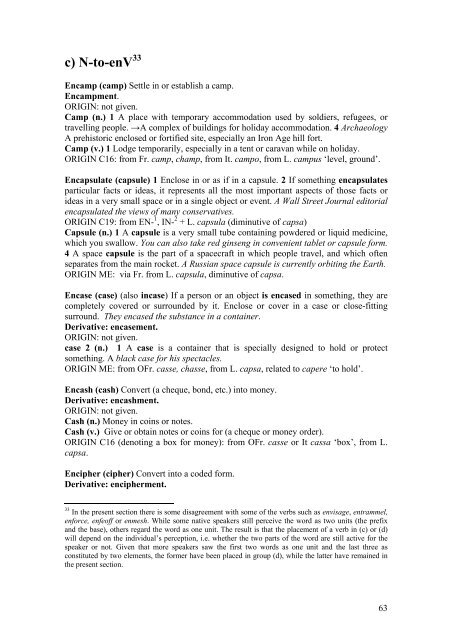Prefixation in English and Catalan - Departament de Filologia ...
Prefixation in English and Catalan - Departament de Filologia ...
Prefixation in English and Catalan - Departament de Filologia ...
Create successful ePaper yourself
Turn your PDF publications into a flip-book with our unique Google optimized e-Paper software.
c) N-to-enV 33<br />
Encamp (camp) Settle <strong>in</strong> or establish a camp.<br />
Encampment.<br />
ORIGIN: not given.<br />
Camp (n.) 1 A place with temporary accommodation used by soldiers, refugees, or<br />
travell<strong>in</strong>g people. →A complex of build<strong>in</strong>gs for holiday accommodation. 4 Archaeology<br />
A prehistoric enclosed or fortified site, especially an Iron Age hill fort.<br />
Camp (v.) 1 Lodge temporarily, especially <strong>in</strong> a tent or caravan while on holiday.<br />
ORIGIN C16: from Fr. camp, champ, from It. campo, from L. campus ‘level, ground’.<br />
Encapsulate (capsule) 1 Enclose <strong>in</strong> or as if <strong>in</strong> a capsule. 2 If someth<strong>in</strong>g encapsulates<br />
particular facts or i<strong>de</strong>as, it represents all the most important aspects of those facts or<br />
i<strong>de</strong>as <strong>in</strong> a very small space or <strong>in</strong> a s<strong>in</strong>gle object or event. A Wall Street Journal editorial<br />
encapsulated the views of many conservatives.<br />
ORIGIN C19: from EN- 1 , IN- 2 + L. capsula (dim<strong>in</strong>utive of capsa)<br />
Capsule (n.) 1 A capsule is a very small tube conta<strong>in</strong><strong>in</strong>g pow<strong>de</strong>red or liquid medic<strong>in</strong>e,<br />
which you swallow. You can also take red g<strong>in</strong>seng <strong>in</strong> convenient tablet or capsule form.<br />
4 A space capsule is the part of a spacecraft <strong>in</strong> which people travel, <strong>and</strong> which often<br />
separates from the ma<strong>in</strong> rocket. A Russian space capsule is currently orbit<strong>in</strong>g the Earth.<br />
ORIGIN ME: via Fr. from L. capsula, dim<strong>in</strong>utive of capsa.<br />
Encase (case) (also <strong>in</strong>case) If a person or an object is encased <strong>in</strong> someth<strong>in</strong>g, they are<br />
completely covered or surroun<strong>de</strong>d by it. Enclose or cover <strong>in</strong> a case or close-fitt<strong>in</strong>g<br />
surround. They encased the substance <strong>in</strong> a conta<strong>in</strong>er.<br />
Derivative: encasement.<br />
ORIGIN: not given.<br />
case 2 (n.) 1 A case is a conta<strong>in</strong>er that is specially <strong>de</strong>signed to hold or protect<br />
someth<strong>in</strong>g. A black case for his spectacles.<br />
ORIGIN ME: from OFr. casse, chasse, from L. capsa, related to capere ‘to hold’.<br />
Encash (cash) Convert (a cheque, bond, etc.) <strong>in</strong>to money.<br />
Derivative: encashment.<br />
ORIGIN: not given.<br />
Cash (n.) Money <strong>in</strong> co<strong>in</strong>s or notes.<br />
Cash (v.) Give or obta<strong>in</strong> notes or co<strong>in</strong>s for (a cheque or money or<strong>de</strong>r).<br />
ORIGIN C16 (<strong>de</strong>not<strong>in</strong>g a box for money): from OFr. casse or It cassa ‘box’, from L.<br />
capsa.<br />
Encipher (cipher) Convert <strong>in</strong>to a co<strong>de</strong>d form.<br />
Derivative: encipherment.<br />
33 In the present section there is some disagreement with some of the verbs such as envisage, entrammel,<br />
enforce, enfeoff or enmesh. While some native speakers still perceive the word as two units (the prefix<br />
<strong>and</strong> the base), others regard the word as one unit. The result is that the placement of a verb <strong>in</strong> (c) or (d)<br />
will <strong>de</strong>pend on the <strong>in</strong>dividual’s perception, i.e. whether the two parts of the word are still active for the<br />
speaker or not. Given that more speakers saw the first two words as one unit <strong>and</strong> the last three as<br />
constituted by two elements, the former have been placed <strong>in</strong> group (d), while the latter have rema<strong>in</strong>ed <strong>in</strong><br />
the present section.<br />
63
















